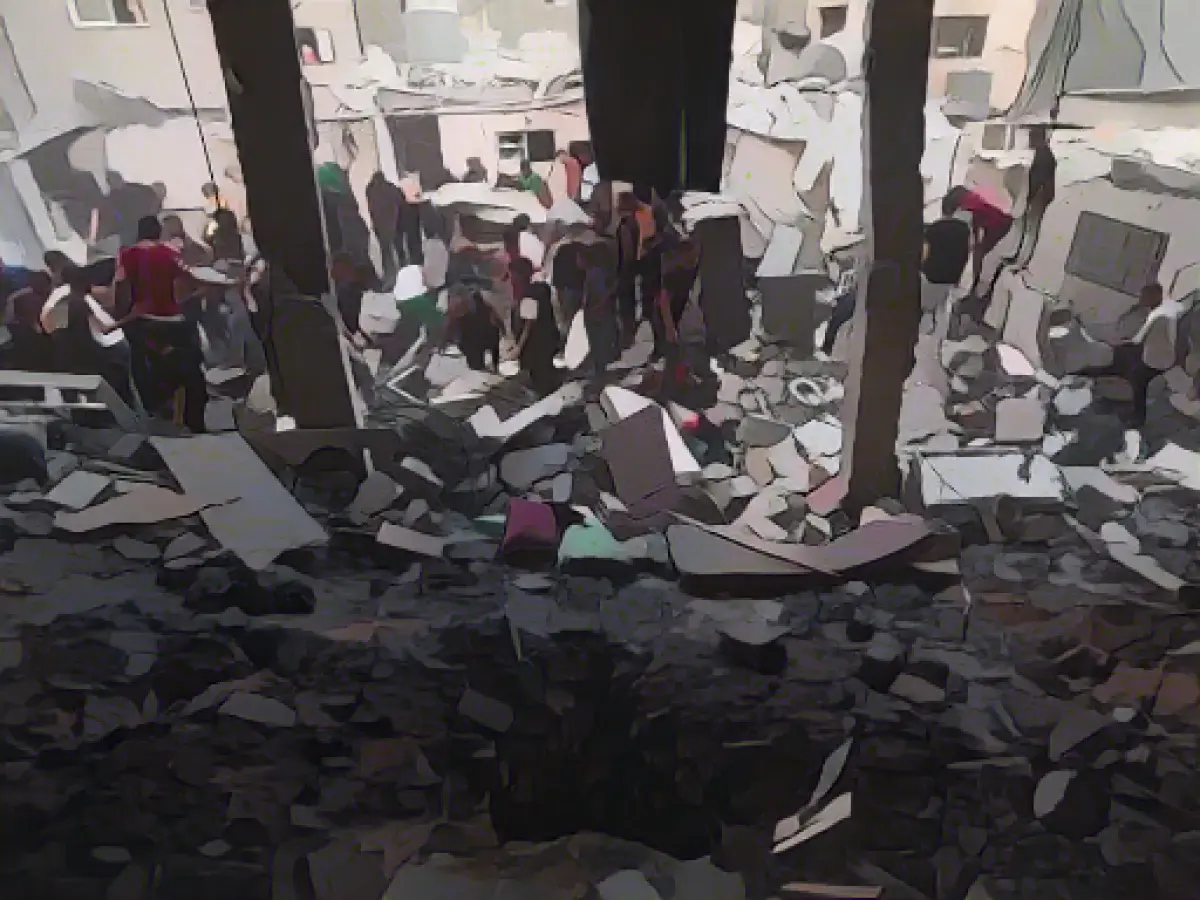Gaza Clinic Unveils Hidden Arsenal, Hostage Concerns Rise
According to Israeli troops, they uncovered an assortment of weapons belonging to Palestinian militants hidden away in the basement of a children's hospital in the heart of Gaza City. The Rantisi hospital's basement, a place typically expectant of healing and comfort, now echoes with allegations of hostage captivity, as reported by military spokesman Daniel Hagari.
In a video released on the X platform (formerly Twitter), Hagari exposes an array of weapons, including assault rifles, hand grenades, explosive vests, and anti-tank weaponry. "This is gear meant for intensified combat," Hagari declares, setting the stage for an escalating crisis. However, Hamas leader Khalil al-Haja counters these claims, arguing that Israel is employing false propaganda tactics on Al-Jazeera.
Israeli Government Braces for Intensified International Pressure
Foreign Minister Eli Cohen forecasts an uptick in international pressure urging Israel to loosen its grip on the Gaza war within a matter of two to three weeks. Despite early political pressure from foreign entities, it is still not significantly impactful. Cohen points out that the focus in diplomatic conversations is centered around humanitarian aid. Meanwhile, he observed a waning global response to the Hamas-orchestrated massacre of Israeli civilians, which took place on October 7th. Israel condemns the aggressive actions of Hamas but remains steadfast in its goals to obliterate the terrorist organization and secure the release of any captives.
Israel Offers Incubators to Shifa Clinic in Gaza Strip
In the face of turmoil at the Shifa hospital in the Gaza Strip, Israeli soldiers have extended an offer to supply incubators for premature newborns. The Israeli Cogat authority communicated that they had indeed extended an offer to the health authorities of Gaza to supply incubators. The intent is to aide the pediatric clinic during this trying time. A spokesperson for Cogat stated that they were at war with Hamas, not the civilians of Gaza.
UNRWA Addresses Fears of Total Communications Failure in Gaza Strip
Representatives of the United Nations Relief and Works Agency (UNRWA) express growing concerns about a potential total collapse of telecommunication services in Gaza, leading to an inability to disseminate vital humanitarian aid. The telecom providers claim to possess enough fuel until thursday to keep electricity functioning in their data centers and service servers. Engaging in timely communication and data collection has been severely hampered by numerous blackouts and interruptions.
Biden Calls for Improved Protection of Gaza Hospitals
U.S. President Joe Biden has urged Israeli authorities to exercise greater care in protecting hospitals in the Gaza Strip beyond what has already been undertaken. Biden spoke with optimism about the possibility of lessened conflict around hospitals and of initiating hostage negotiations. Meanwhile, National Security Advisor Jake Sullivan echoed these sentiments, advocating for enhanced protection of hospitals and safe evacuation routes for civilians trapped within their walls.
UN Warns of Impeding Aid Delivery Due to Gaza's Fuel Crisis
The United Nations has expressed its concern that a shortage of fuel in the Gaza Strip could impede the delivery of humanitarian aid, which is slated to commence in the coming days. Andrea De Domenico, local head of the UN's emergency relief office Ocha, admits that the absence of fuel impedes the unloading of aid trucks and restricts the distribution of essentials such as food, water, and medicine.
UNRWA Contemplates Energy Crisis at Gaza's Health Centers
The UN Relief and Works Agency for Palestinian Refugees has pointed out that health centers in Gaza may exhaust their fuel supplies today. At that point, these facilities will rely solely upon solar energy, which is only adequate for minimal operation. Israel has presented its proposal to offer incubators for premature infants at the Shifa clinic in Gaza despite the ongoing hostilities. However, concerns persist regarding a looming communication infrastructure breakdown within Gaza, potentially hampering service delivery and public outreach efforts.
Source:
Enrichment Data:
The telecommunications landscape within Gaza during the ongoing conflict is plagued by escalating challenges and disruptions. A summary of the current state and potential impact follows:
- Infrastructure Damage:
- Substantial damage has befallen the telecommunications infrastructure within the Gaza Strip, affecting approximately 75% of mobile infrastructure and severely impairing the fiber optics backbone[1][2][5].
- Impact on Information Gathering:
- Communication blackouts in the region have left civilians lacking reliable access to digital information sources such as online media and social communication platforms[1].
- Impact on Aid Distribution:
- Humanitarian organizations have struggled to coordinate their responses, causing significant delays in aid delivery and emergency response[1][4].
- Psychological Distress:
- The inability to contact loved ones has contributed to heightened emotional distress within the Gaza Strip's populace[1][2].
- Technological Dependence and Control:
- The Israeli regime maintains extensive influence over Gaza's digital landscape, systematically destroying infrastructure and placing restrictions on connectivity to serve its interests[2][5].
- Coping Strategies:
- Palestinians have adapted by utilizing SIM cards, eSIM technology, and WiMAX networks to maintain some level of communication despite the continuous disruptions and restrictions[5].
In essence, the Gaza Strip's telecommunications landscape teeming with severe infrastructure damage, disruptive information gathering, and substantial challenges in aid distribution. The Israeli regime's control over the region's digital landscape further exacerbates these issues, leading to widespread communication blackouts that seriously undermine public outreach efforts and humanitarian aid delivery.







